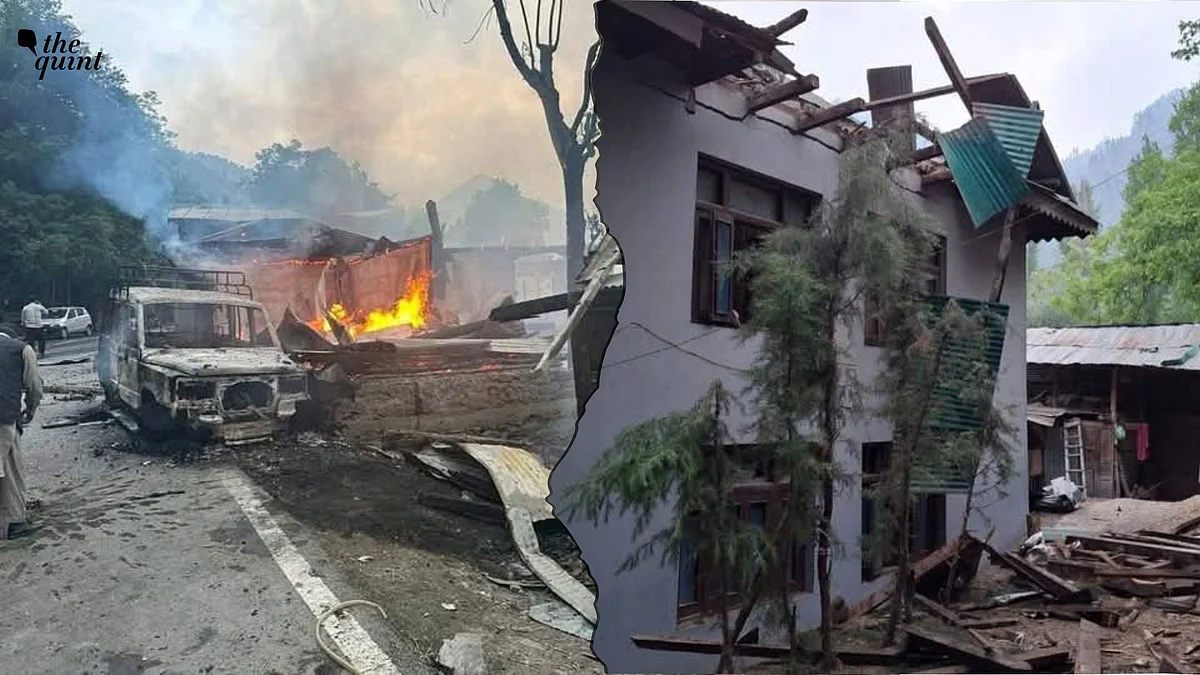‘They Didn't Even Know What War is’: Aunt of 2 Minors Killed in Poonch Shelling
Several homes, shops, religious sites and public infrastructure were destroyed in Poonch town.

advertisement
As the sun rose over smoke-scarred rooftops on the morning of 8 May, Shaheen Khan sat on the broken steps of her house in Poonch, clutching a photo of two children — her 14-year-old nephew Ayan and 12-year-old niece Aruba.
Back in the alley near the bus stand, a bloodstained shoe lay under a burned-out vehicle. Shaheen picked it up slowly, brushing dust off its worn sole.
“Ayan had just bought these for Eid,” the 48-year-old aunt murmured.
At 1:15 am on Wednesday, 7 May, the night sky over Poonch, a border town in Jammu and Kashmir, lit up like a battlefield. The heavy cross-border firing continued until around noon the following day.
Between Wednesday night and Thursday morning, Pakistan reportedly shelled civilian areas in different parts of Poonch, including the town’s main bus stand and nearby residential zones, in response to India launching 'Operation Sindoor', a military strike targeting terror infrastructure in Pakistan based on credible intelligence inputs.
“The shelling has ruined the smile of our entire community,” Shaheen told The Quint, her voice cracking between sobs. “But it shattered my family from the inside."
The aftermath of cross-border shelling in Poonch town.
(Photo: Sourced by Arsalan Bukhari)
“Ayan… he was everyone’s favourite. The way he spoke—always quick with a joke or a wise little thought—it used to melt my heart. Now, I can’t even step into the room he shared with his sister. It’s too quiet. Too empty.”
‘The Smile of the Whole Community Is Gone’
“I thought it was Qayamat,” said 36-year-old Wahid, who was staying at his uncle’s house when the first shells rained down.
“We heard cries, and then bangs — closer and closer,” said Anwar Hussain Shah, another resident of Poonch.
“My brother dragged me out of bed. Within minutes, we were on a tractor, driving blind in the dark. We fled 20 kilometres to a madrassa. I didn’t even have time to put on my shoes.”
For many in Poonch, the shelling marked the worst night of their lives.
Houses destroyed in Poonch town as a result of cross-border shelling.
(Photo: Sourced by Arsalan Bukhari)
A Town Caught in Crossfire
The shelling came just a day before Indian security forces reportedly intercepted a major Pakistani drone operation targeting at least 15 locations across the country. Though the drone attack was thwarted, it pointed to rising tensions between the nuclear-armed neighbours.
But for residents of Poonch, geopolitical flashpoints mean little in the face of personal loss.
Saleem Ahmed, a schoolteacher who lives near Syndicate Chowk said, “Around 6:35 am, I saw smoke, first faint, then growing. Then I heard the blasts — one, then another, and another."
The local gurdwara sustained partial damage. So had the nearby mosque. For Poonch, a symbol of plural coexistence in a volatile border district, the shelling didn’t just wound bodies—it wounded trust and safety.
Amreek Singh, a shopkeeper, was among the people killed in the cross-border shelling in Poonch on 7 May.
(Photo: Sourced by Arsalan Bukhari)
‘People Ran to Save Their Life’
Some survivors described scenes reminiscent of historical trauma.
“People were running in every direction,” said Ruksana Bano, who rushed to the district hospital minutes after the first blast.
She added,
A local doctor, who wished not to be named, said the number of pediatric casualties was particularly disturbing. “You expect military conflict to harm soldiers. But these were schoolkids. They’d done nothing."
'Never Seen Anything Like This': Fear Lingers as Silence Returns
Though no further shelling occurred since then, fear still hangs heavy in the air.
“In 20 years of my adult life, I’ve never seen anything like this,” said Wahid. “Even during earlier cross-border tensions, we never expected a direct hit on civilian zones like this.”
The local administration has promised compensation and reconstruction aid. But the survivors remain sceptical.
“What compensation can bring my child back?” said Shaheen Khan. “What security can erase what these children have seen?”